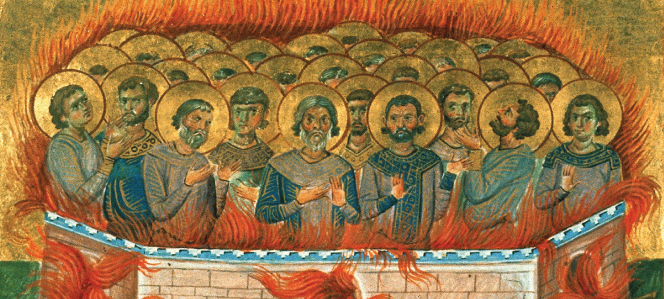When I am asked why I have four kids, my favorite answer is, “Because I’m Catholic.” In this simple yet provocative answer I achieve what might be known as ‘The Apologetics of Witness.’ It says to my interlocutor that I have allowed my faith in the Church to affect how I make my life’s decisions. Also, in a time when simply being Catholic isn’t necessarily proof of adherence to the moral teachings of the Church, it brings to light the fact that there are still those who love and live what the Church practices. Witnessing to the power of Christ in the lives of the ordinary does something that argumentation will never achieve, it reaches the heart. By adhering to the beliefs and practices of the Catholic faith and unabashedly living them out we witness to the world through a way of life which is good, true and beautiful.
Indeed, we live in a time and culture that makes it easy to turn our gaze away from our Lord. It is easy to be a pessimist about the prevailing indifference to the Gospel, but rather than moping around and wishing that the culture was different, we must recognize that we are graced with the ability to unabashedly proclaim Christ in the culture and bring to fulfillment the admonition of the Lord Jesus, “Every one therefore that shall confess me before men, I will also confess him before my Father who is in heaven.” (Matthew 10:32).
One of my favorite activities is to take out a book of saints and learn more about some of the most obscure men and women who either gave their lives or lived such a radically Catholic lifestyle that the Church recognized them as heroically virtuous. Last Friday marked the feast of St. Eudoxius, of whom little is known. The small amount we do know is that he died in the year 311 A.D. under the persecution of Emperor Galerius, who with the help of Diocletian, the man known for horrendous persecution of Christians, sacked the ancient empire of the Sassanids. The Sassanids ruled the area that is now modern day Iran. Eudoxius was a soldier and was martyred alongside several companions in Melitene, Armenia.
Since so little is known of Eudoxius, certain presumptions and conclusions must be drawn. One fact that jumps out is that Galerius had Eudoxius, one of his own soldiers, killed because of his profession of faith in the Lord Jesus. Perhaps Galerius felt that the virtues embodied by Christians, anti-violence, meekness and forgiveness did not sit well with the battle plans of the imperial domination. Or perhaps it was because the figure of Christ and the reality of His Kingship were a challenge to the political and cultural status quo of the Roman empire. It seems that while Eudoxius very well could have carried out his soldierly duties with honor and sacrifice, the possible threat of Christ, allegiance to whom, comes before the State, was too much for the powerful. One must wonder: who were Eudoxius’ companions? Did they also sing praises to God on their way to their execution? What was it about their ‘apologetics of witness’ that so irked the ruling class?
We mustn’t forget that we are all called to be such prime witnesses to the power and affection we have for a God who loves us, there are so many examples in the current day of Christians who suffer persecution, even giving up their lives rather than deny their faith in Christ. Often in our safe borders of the United States and the West we might take for granted that the relative freedom in which we can practice the Church’s Faith is somehow a universal experience. It is not. The seemingly horrific situation of Christians in the Middle East reveals the truth that the time of martyrs such as Eudoxius is not over. But how can we affect a change from halfway across the world? The answer is in our own witness to our faith in Christ in the cultural context that Providence has embedded us.
When we live out our faith in a radical way, (and by radical I do not mean bible-thumping, rah-rah arguing, debate ready, mental boxing) but by clearing our own walls of the heart so that Christ and His Holy Spirit might infuse us with faith, hope and love so deeply, so overwhelmingly that we echo St. Paul and proclaim, ‘It is no longer I who live, but Christ who lives in me.’ The gifts of faith, hope and love conform us to the image of Christ and enable us to overcome any reticence to be bold and creative witnesses to the Church’s Faith. So often is seems that everyone else in the world has illusionary goals that they are willing to give their lives for, yet these are just as fleeting as the pretenses of imperial power represented by the tyrant, Galerius. The goal of a disciple of Jesus is to become ever more like him and this can happen if accept as our own way of life the Church’s Sacraments, the discipline of prayer, conformity to the beatitudes by performing works of mercy, and desiring Christ’s living and divine presence given to us in the Blessed Sacrament. This way of life changes us. This creates a person willing to make change for the better by unveiling something beautiful and true for the world to see. It is through the unique Christian way of life that seeks conformity to Christ in all things that we live out an ‘apologetics of witness’ and honor the memories of a saints like Eudoxius and his companions, as well as the martyrs of today.
